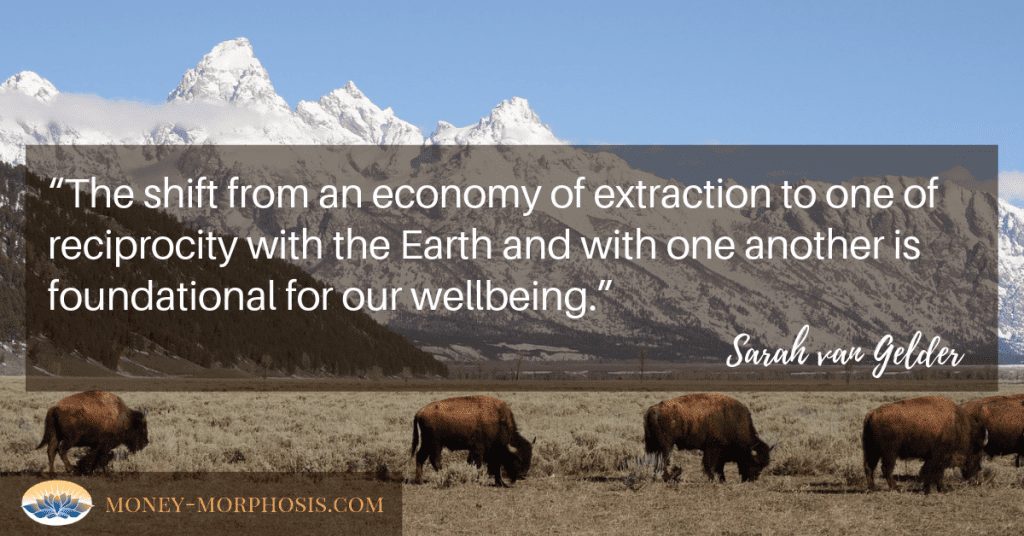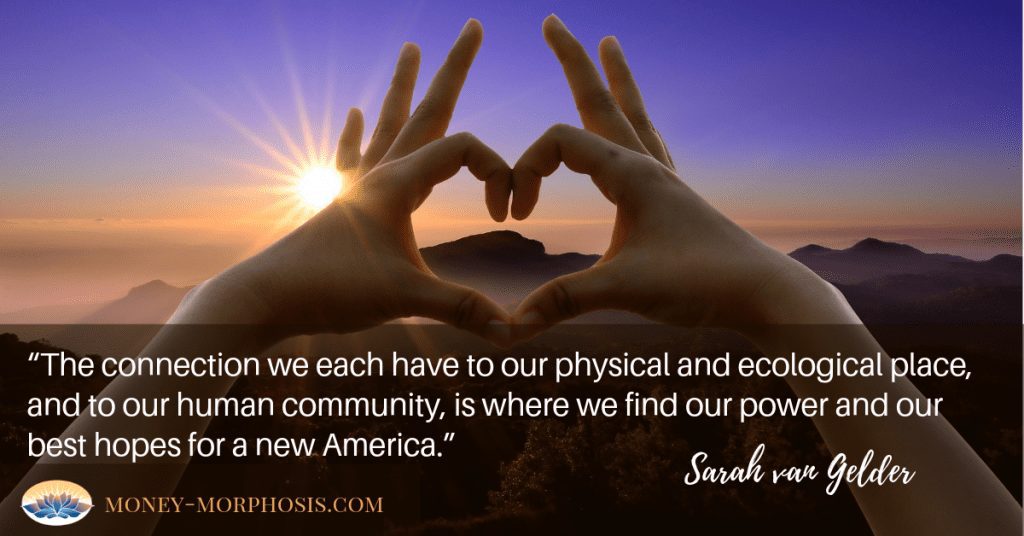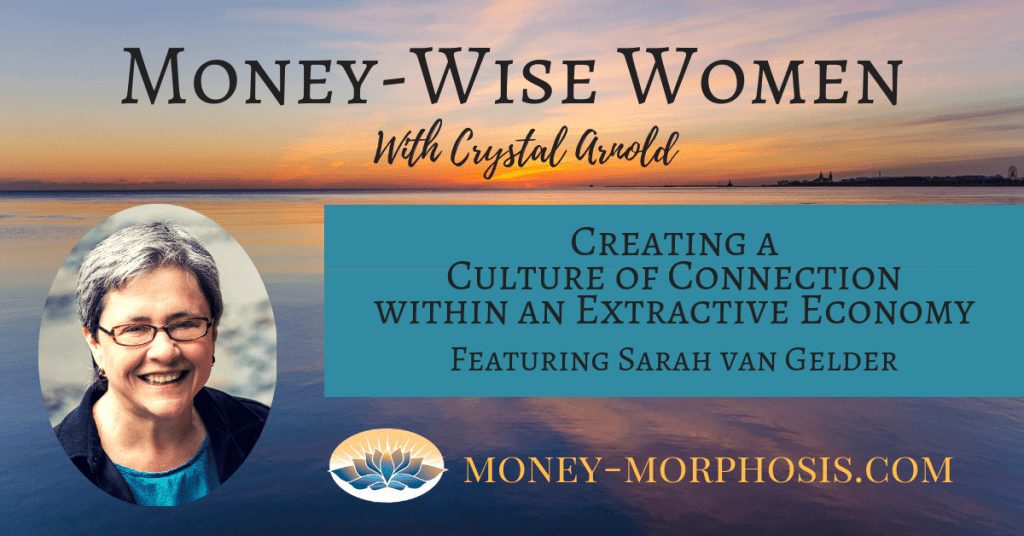Editor’s note: Yes! Magazine’s founding editor Sarah van Gelder journeyed 12,000 miles across the United States, researching grassroots social movements for her groundbreaking book, The Revolution Where You Live: Stories from a 12,000-Mile Journey Through a New America. She found what she had hoped to find: an enormous wealth of creative commitment and practical solutions to some of the most intractable problems our society faces. At the heart of the problems—and the solutions—are deep questions about our economy, which is why Esperanza Project collaborator and Money-Morphosis founder Crystal Arnold decided to interview Sarah after her journey. Here, Crystal shares highlights from that interview in the Money-Wise Women podcast. Listen to the entire podcast here.

As Sarah van Gelder made her way across the U.S., talking to people who are working, one community at a time, toward a better, more inclusive, more regenerative future, she ran across a mural that summed up a concept she would return to again and again. This mural appeared in the ordinary urban landscape of Newark, New Jersey: “We the People LOVE this place.”
This kind of allegiance is central to a more intimate economy. Discussing her time at Standing Rock and her experience with a community in Montana where Native Americans and ranchers joined forces to stop a mining operation, van Gelder explains that “there is a moral authority that comes with representing a place.”

That connection to place is one of the factors needed to create a life-affirming economy that engages and values each individual’s unique genius. There are others, as well, which van Gelder explores in her book The Revolution Where You Live: Stories from a 12,000-Mile Journey Through a New America.
The book traces van Gelder’s journey across 18 states. She met and interviewed a variety of citizens who are enacting significant change: for example, stopping a giant coal mine, bringing urban farming into the heart of Chicago, and working to move Greensboro beyond its legacy of racism. Each story illustrates ordinary people engaging in extraordinary ways to catalyze a cultural renaissance.
One of the most interesting stories is from Chicago, where she found a little co-op called “New Era Windows” that had been started by a group of factory workers. The project had evolved from a crisis a few years earlier when the factory owner shut it down without paying the workers’ back wages. The workers responded by occupying the factory and ultimately got their wages, but the owner sold the factory to another owner, who shut the factory down again. This time the workers were ready.
“They said, ‘You know what? We think we can run this factory ourselves. We would like to buy it and operate it,’” van Gelder recalled. And that’s just what they did.
“They realized one of the ways they can do it profitably is that they don’t have to pay huge CEO wages and benefits to someone making a hundred times what they’re making, and they don’t have to worry about paying back Wall Street with exorbitant interest or dividend rates,” said van Gelder. “They can just make enough to cover their salaries and the cost of doing business, and maybe a little extra for expansion — but they don’t have to be making huge amounts of money. And it’s such a switch for them to think about that.”
The workers told van Gelder about the many times when they’d been working on the factory floor and could see ways to make things work better, but managers weren’t interested in those ideas.
“They told us to be quiet,” they told her. “Now when we see something that can be done better, we talk amongst ourselves and we can make it happen.”
Creating a worker-owned cooperative is one way to unleash the creativity inherent in the smart human beings that we are, said van Gelder, because the workers run the business, they respect one another and they run it democratically. Collective ownership of enterprises creates more vibrant local economies. As humans participate in their ecosystem in more conscious ways, our wellbeing improves. Cooperatives, land trusts, and credit unions are effective means to creating a culture of connection within an extractive economy.

We build a culture of connection through exchanges. An economy from the heart breaks free from the violence of extraction through life-affirming exchanges that contribute to the well-being of people and planet. Van Gelder describes communities that are becoming more informed and engaged. Their resilience is created through diversity and connection. As people are engaging in meaningful ways in their communities, they satisfy that human need for belonging.
A healthy economy is created as people contribute to their communities while having their needs met. As van Gelder says, “That shift, from an economy of extraction to one of reciprocity with the Earth and with one another, is foundational for our well-being.”
Economic reform is essential for cultivating well-being, certainly, and this includes investing, banking, lending, and currency. But through something much greater than bills and coins, through a new awareness of true wealth, a new economy emerges. Individuals engage in life-affirming transactions not as consumers but as collaborators and co-creators, and, as individual behavior shifts, that catalyzes community-level change and ultimately institutional reform.
What is needed to steward shared resources with integrity to create true wealth and well-being for all?
A core goal of this transformation of value is economic and social resilience through decentralization of power. Collective intelligence is cultivated through pathways of engagement based on horizontal, mutual respect, rather than clogged pathways of vertical, pyramidal, or hierarchical authority. Movements such as participatory budgeting show what is possible when the public becomes informed and engaged.
In Cleveland, van Gelder met with organizers of an inspiring cooperative. Area hospitals, a local foundation, a couple of universities, and a national organization dedicated to local wealth building—the Democracy Collaborative—formed the Evergreen Cooperatives to encourage more local exchanges. The cooperative model taps into the individual’s genius and develops stronger relationships because individuals are stakeholders.
The book is packed with stories of people organizing around both water and food, bringing back traditions, and creating cooperatives to provide access to fresh food. Modern isolation has impoverished our communities, as we are separated from each other and the place we live and even from our neighbor next door. We are wealthier than we even imagine when we begin to map the resources of people within the community.

It’s an experimental time, mutable and messy. Asking questions is now much more important than repeating answers. The engagement of determined and progressive individuals in the community is essential for building and sustaining a powerful localized economy, in food production, entrepreneurship, humanitarian development, manufacturing, services, and stewardship. Together, we are mighty.
Sarah van Gelder is a founder of a nonprofit called PeoplesHub, which offers live, online training to local groups around the country who want to make change where they live. Sarah is also YES! Magazine co-founder and author of The Revolution Where You Live: Stories from a 12,000-Mile Journey Through a New America (Berrett Koehler, 2017). Sarah is currently communications manager for the Suquamish Tribe. YES! Magazine is a publication that is nationally recognized for exploring leading-edge solutions to the major ecological and human challenges of our times. The magazine has won numerous awards for its coverage of such topics as the cooperative economy, mass incarceration, neighborhood sustainability, and personal resilience.
Crystal Arnold, B.S. International Economics, is an author, inspirational speaker, and group facilitator, founder of Money-Morphosis and the “Money-Wise Women” podcast and is Education Director of the Post Growth Institute.
- Decolonizing Finance with Kat Taylor - November 22, 2019
- The Revolution Where You Live - July 7, 2019
- Finding Our True Wealth - May 20, 2019
cooperative economies Money-Morphosis regenerative economy Sarah van Gelder worker cooperatives